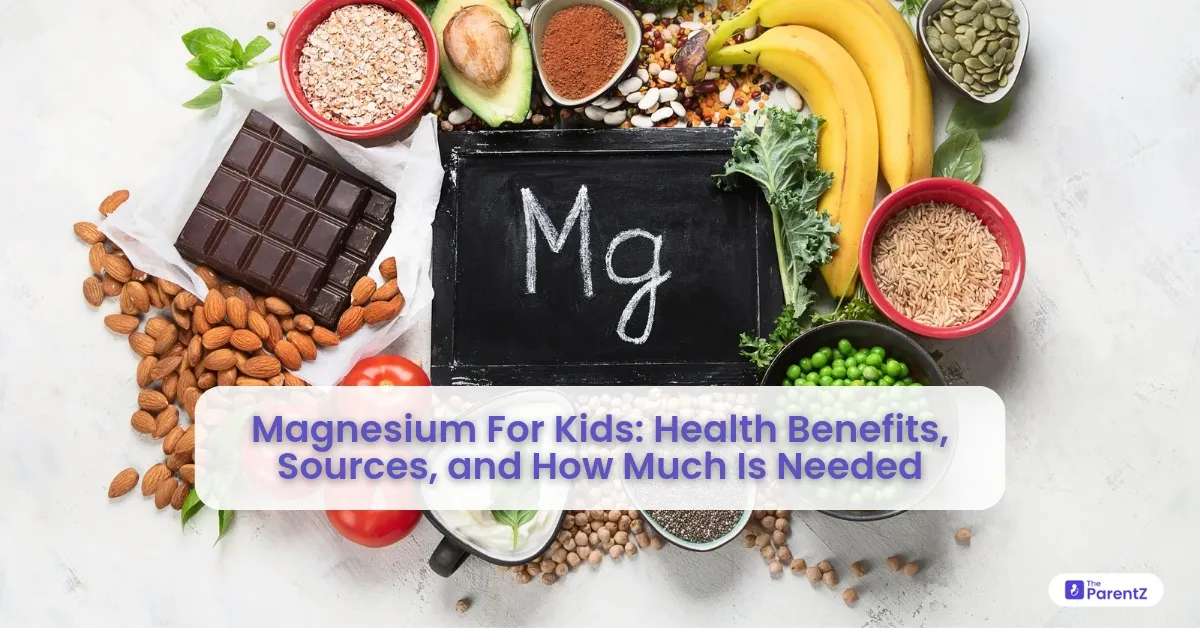You probably know about calcium for strong bones and iron for energy, but magnesium? It’s often the quiet hero of the nutrient world — overshadowed by flashier vitamins but absolutely vital for growing kids. The truth is, magnesium plays a role in over 300 biochemical reactions in the body, from building bones to helping little hearts keep a steady beat.
Read this article to explore the health benefits of magnesium for kids, its sources, and the right dosage.
Why Is Magnesium So Important For Kids?
Do you know what happens inside your child’s body every second? Muscles contract, nerves fire, cells grow, and bones harden. Magnesium is involved in all of these behind-the-scenes jobs. This mineral not only helps convert food into energy but also ensures that calcium and potassium do their jobs properly, which is essential for muscle function and a healthy heartbeat.
Studies show that magnesium is closely tied to bone development, especially during those childhood growth spurts when your kid’s legs seem to grow overnight. A deficiency may also contribute to muscle cramps, anxiety, fatigue, and even trouble sleeping. According to the National Institutes of Health, children between the ages of 4 to 8 need around 130 milligrams daily, while those aged 9 to 13 should aim for about 240 milligrams. The need grows as their bodies grow, so don’t underestimate this mineral’s importance.
Health Benefits Of Magnesium For Kids
Magnesium is essential for children’s growth and daily well-being. First and foremost, it promotes strong bones and teeth by helping the body process calcium properly. In fact, bones store about 60 percent of the body’s total magnesium, which highlights just how critical it is.
Beyond the skeleton, magnesium helps regulate nerve function and muscle relaxation, making it easier for kids to avoid the nighttime leg cramps that can wake them up in tears. It’s also linked to improved mood and better sleep quality, which benefits parents as much as kids! Some research even suggests that adequate magnesium intake can help lower the risk of developing type 2 diabetes later in life by aiding in blood sugar regulation.
Best Natural Sources Of Magnesium For Kids
You don’t need to run to the pharmacy for magnesium supplements — most kids can meet their daily needs through a well-balanced diet. Green leafy vegetables like spinach, kale, and Swiss chard are powerhouses of magnesium. But if your little one wrinkles their nose at greens, no worries — plenty of kid-friendly foods are rich in this mineral too.
Nuts and seeds like almonds, pumpkin seeds, and sunflower seeds make for great magnesium-packed snacks. Whole grains such as brown rice, quinoa, and oats also sneak magnesium into meals, and dairy products like yogurt can give your child an added boost. Yes, even dark chocolate (in moderation, of course) is a tasty magnesium source.
How Much Magnesium Do Kids Really Need?
The right amount of magnesium changes with age. For infants up to six months, the recommended intake is around 30 milligrams daily, while babies from seven to twelve months need about 75 milligrams. Toddlers aged one to three years need roughly 80 milligrams, and as they hit the four to eight age bracket, that number jumps to about 130 milligrams.
Older kids between nine and thirteen years old should aim for around 240 milligrams per day, and teenagers even more. Keep in mind that needs can vary slightly based on activity level, growth rate, and overall health, so if you ever feel unsure, a pediatrician can help tailor the advice.
Should You Give Magnesium Supplements?
Well, not unless a healthcare provider recommends it. While magnesium supplements are often marketed as miracle fixes for sleep troubles or muscle cramps, most kids get what they need from food.
Over-supplementing can actually backfire, leading to diarrhea, nausea, and stomach cramps. If you’re concerned about magnesium levels, a doctor can run simple blood tests to check whether your child is truly deficient before suggesting any pills or powders.
Conclusion
Magnesium may not grab headlines the way calcium or vitamin D does, but it’s every bit as crucial for your child’s growth, development, and day-to-day energy. From steady heartbeats to strong bones and better sleep, this mineral does more heavy lifting behind the scenes than most of us realize. When in doubt, always check with your pediatrician to make sure your child’s nutritional puzzle is complete.





Be the first one to comment on this story.